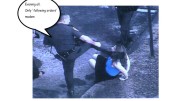Now journalists may be some people’s ‘five-minute hate’ target for the moment especially for Left with the Levinson enquiry. However, without journalists, our ability to scrutinise the state will be greatly reduced.
However, it seems that the police are possibly conducting fishing expeditions among the journalistic community and I’m surprised about the number of arrests. This cannot be good for free speech or the protection of confidential journalistic sources. The arrests seem to have gone beyond the hacking allegations and into harassing crime correspondents into breaking their links to their police contacts.
I certainly agree with Mr Cohen when he says that:“The police, prison service and armed forces are the coercive arm of the British state. We should want them to be leaky. We should want those in charge to fear that the public can find out what they are doing.”
The trade paper for UK journalism is the UK Press Gazette and this edition has a thought-provoking article by Nick Cohen on the subject of the recent arrests of journalists.
The article is linked ( http://www.pressgazette.co.uk/content/nick-cohen-condemns-censorious-police-power-unleashed-against-media ) and also copied and pasted below.
——————————————————————————————————————————————-
“It took London’s genteel Metropolitan Police three searches of the home of missing schoolgirl Tia Sharp before they found the resolve to do a thorough job and find the poor girl’s body. Critics who condemned the cops’ timidity should have understood that the police were only investigating the alleged murder of a child. If they had been dealing with journalists rather than major offenders, the Met’s crack detectives would have shown their mettle.
To date, they have ordered the wife of one Sun reporter from her bed; that she was suffering from cancer in no way inhibited them. Her husband later attempted suicide. Another journalist tried to slash her wrists. A third is in the Priory at time of writing.
Detectives have burst into homes at dawn, torn up floorboards and seized the computers not just of reporters but of their partners and children too.
Deputy Assistant Commissioner Sue Akers of the Metropolitan Police was once an undistinguished officer but now enjoys a dubious distinction: no detective in the democratic world has arrested more journalists. If Ms Akers were working for Putin’s Kremlin, there would be an outcry. But the mass arrest of British journalists has been met with indifference at best or approval at worst.

When I voiced a few misgivings in The Observer, readers were baffled and a little angry. Was I saying that journalists are above the law? Was I supporting Rupert Murdoch (an unforgivable sin in the eyes of many)?
Their incomprehension reflected how unloved a liberty freedom of the press has become.
Read the Mail or the Telegraph, and you realise that many on the Right would close the BBC if they could. Read The Guardian and The Independent, and you realise that many of the Left would do the same to the tabloids. Both sides believe in freedom, but only for their friends and allies.
Answering complaining readers is impossible when there have been no trials or conviction. But I can still say there are reasons to protest, not about the hacking arrests but about the hounding of crime and general news reporters for allegedly paying public officials for information.
No one need worry that voicing reasonable concerns is “supporting Murdoch”. The old plutocrat has betrayed his journalists as he has betrayed so many others. To save their master, his underlings led by the remarkably unattractive figure of Will Lewis, are going through reporters’ expense accounts and emails and handing anything that might be incriminating to the police.
Their behaviour has its ludicrous side. Leaving aside the fact that journalists’ expenses have never been the most accurate of documents – to put it mildly – detectives are asking hacks to justify claims for “entertaining a police officer” from four, five, six years ago. Even assuming they handed over a direct money bribe, and that assumption will be tested in court, where do the detectives think the reporters got the money from? From their own bank accounts? Or from Mr Murdoch, who was being feted by Boris Johnson and Jeremy Hunt at the Olympics, while the police were questioning his employees?
Growth of a prosecutorial alliance between state and corporate power
Rather than seeing a challenge to Murdoch we are seeing the growth of a prosecutorial alliance between state and corporate power. The realisation that they are caught between their employers and the cops is driving reporters to attempt suicide. They can see no way out.
More is to come. I hear that Express Newspapers has warned its staff that they must keep their emails or risk being fired for gross misconduct.
If the Murdoch family is trying to save its business interests in Britain, the Met is trying to save face. Compromised by allegations that it failed to investigate hacking because it did not want to upset newspaper proprietors, it has retaliated with vigour.
Senior officers, and indeed ministers and mandarins across the bureaucracy, also relish the chance to intimidate potential whistle-blowers. A fear of the consequences of leaking unauthorised information is spreading – a fear that pleases our masters greatly.
An example from New Scotland Yard’s press office shows how dangerous it is for a public servant to have any contact with a reporter, however trivial or absurd. The Mail reported that the police had arrested a former boyfriend of Amy Winehouse on a rape allegation. He was duly charged. But the cry went up “how did the Mail know about the arrest before the charge”. A wretched and as I hear it innocent press officer’s job was on the line because he had mentioned that he had bumped into a Mail journalist on the street and bought her a cup of tea. Although, it’s his job to talk to journalists, he became a suspect.
We should want the police to be leaky
Now it may be that my fears are ill-founded. Perhaps Ms Akers is arresting journalists for open and shut cases of corrupting public officials. This is not what my sources are telling me, but they may be biased. If not, the past year will be remembered as a time when authority became more unaccountable; when potential sources learned that they could be fired and sent to court; and the journalists who talked to them learned the same.
The police, prison service and armed forces are the coercive arm of the British state. We should want them to be leaky. We should want those in charge to fear that the public can find out what they are doing. Now they are more secretive than ever. The people who are cheering on the round-up of the despised tabloid hacks are the same people who want to scrutinise the state. They are about to learn that censorious power does not only target people the respectable despise. Once unleashed, it oozes across boundaries and suffocates stories that right-thinking people rightly believe the media must publish.
You cannot have it both ways. If you want to hold power to account, you ought to worry about the mass arrest of tabloid journalists and wonder who will be next.”





